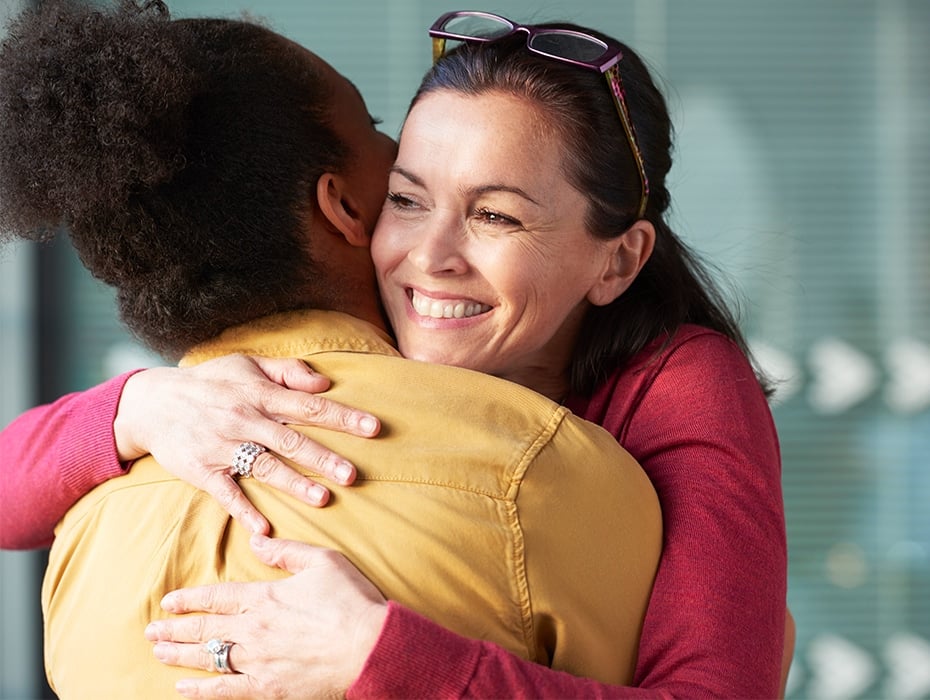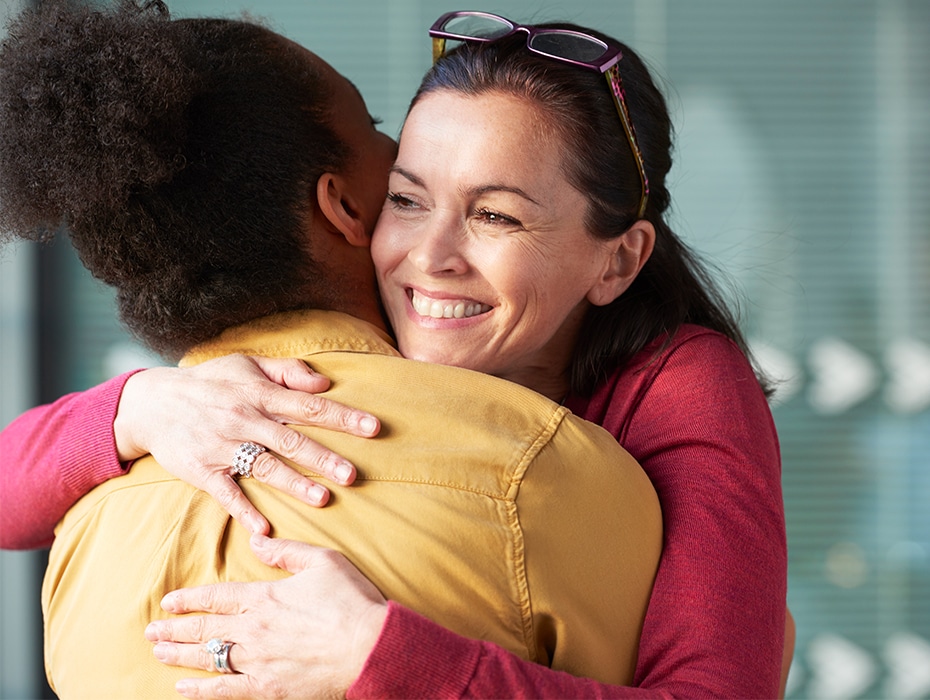
Highlights:
- Employee Resource Groups (ERGs) are voluntary, employee-led groups whose aim is to foster a diverse, inclusive workplace aligned with the organizations they serve.
- ERGs build high-trust relationships that foster a sense of belonging, inspire conversation, broaden perspectives and drive innovation.
It’s the moment we’ve been holding our breath for: 714 days after our offices were shuttered and we set up shop at home, the email finally arrived—we’ll be returning to the office in less than a month!
But with the relief of returning to a sense of normality, a bittersweet kiss goodbye to the dark days of juggling work, kids, and home life, comes a sense of sadness. The realization that I’m not the same person I was 714 days ago; so much has changed for me as a woman, both personally and professionally. And at this pivotal time of Women’s History Month and a return to the office after two years of struggle and transformation, I reflect on what has helped drive these changes. A central catalyst that sticks out in my mind is our Employee Resource Groups (ERGs) here at RingCentral.
ERGs are a central part of our culture. We currently have 10 ERGs* and many other communities for everything imaginable – from culture, to home chefs, to pet lovers, to music makers, and everything in between. I sat down with the women that lead and contribute to the core ERGs to talk about the impact these groups have had on them during the pandemic and why they’re an invaluable resource for any large organization on the road to gender equality .
In these conversations we uncovered five powerful ways that ERGs are supporting the cause:
Connections across borders, cultures, and backgrounds
I remembered back to those now alien office days of early 2020. I don’t think I was a member of any ERG at that point. I had yet to hear of SaaSY Women, a now 400+ strong group of inspiring females (and their male allies) that has been central to the gender equality debate here at RingCentral.
Fast forward two years later and a very different company-wide narrative exists. SaaSY Women, and all of the ERGs, have connected us across the world, opened our minds to different ways of thinking, and helped combat our isolation. And that can have – and has had – a profound impact. “It made me feel like I’m not on an island, and I am part of something great”, Jules Coffman from the Veteran’s group commented. Her group, which supports veterans that work at RingCentral, has gone beyond the virtual ERG moniker and set up a fully in-person group meet-up, locally in her homebase of Ohio. “These groups have brought a lot of people even closer together than we probably would have been in the office even if they had been created in the office.” Marissa Best of the Mom’s Support Group points out.
Moms have been hit hard by the pandemic. Among adults ages 25-44, out-of-work moms were nearly three times as likely (32% vs. 12%) as out-of-work dads to cite COVID-related childcare issues as the reason they were not employed**. Having a place where we can share everything from potty training woes to the working/schooling juggle has been a mental health safety net for so many of us. But it’s not only moms who are feeling the benefits of the welcoming community ERGs provide. Sheevaun Thatcher of the Rainbow Room, a safe space for our LGBTQ employees and their allies, agrees: “Being part of a global community, you gain more understanding of each other’s human struggles.” Knowing that there is someone out there going through the same thing is comforting and has been vital to all of our sanity during these unprecedented times.
Women are particularly social creatures and thrive on connection. In fact, 65% of women found social isolation hard to cope with compared to 33% of men***. It’s powerful to hear experiences from those who have entirely different backgrounds. What these ERGs have created is a true safe haven for people to open up and share real life struggles in an uncertain world.
A safe haven that promotes belonging and trust
When women feel connected, they feel safe to share their experiences. They can kick that ever omnipresent imposter syndrome to the curb, build trust and belonging, and ultimately be their true selves. As Brene Brown, Research Professor and expert on shame, belonging, and vulnerability says “True belonging doesn’t require that we change who we are. It requires that we be who we are.”
Kira Arnold of SaaSY Women comments, “Just having other people to talk with and know that they are feeling a similar type of way is really just beneficial to have that sense of belonging” and Marissa of the Mom’s Support Group notes: “As a woman and a mom you always second guess yourself, you have imposter syndrome. Knowing that there was support there, regardless of what I was experiencing and that everybody was willing to lend that helping hand was reassuring.” Belonging doesn’t just give us all a warm fuzzy feeling, it’s important to the entire company culture: “It increases the culture significantly and it increases this sense of safety because everybody wants to know that they are safe, that their job is safe and that their families are safe.” says Sheevaun, who shared a really beautiful story of support for a Trans parent in the Rainbow Room.
These are not the typical conversations you’d get at the water cooler. But maybe they should be. Maybe what we’ve experienced these past two years means we’ll bring a more true version of ourselves back to the office with us. Maybe we won’t hide those parts of us we once did: the stories of sick children, elderly parents, a trans loved one who is struggling. These are human stories that we are all living with and having a safe space to deal with them is essential to connection. Let’s hope we can stay open and vulnerable as we sweep the cobwebs off our desks and join our teammates in person again.
Personal growth: Confidence, empowerment and freedom
It’s remarkable what can happen when women feel connected and safe to speak up in a judgment-free zone. Getting through the discomfort of being your true self, opens up a huge opportunity for personal growth, for confidence, empowerment, and freedom. As Leslie Ordinario, from the Manila Culture group, which keeps our Philippines teammates engaged and inspired, puts it “Being a part of these groups helped me grow as a person, as a woman. It even improved my personal relationships by giving me new perspectives” and Irene Luong of the Pan-Asian group, a safe space for our large asian employee base, notes: “You get feedback without judgment. That helps you personally grow and do some self improvement.”
This newfound confidence and freedom women are finding themselves is a huge positive for companies as they look to promote women from within. Ashley Madrigal of the HOLA group, which represents our Hispanic employees and allies, has noticed: “Leading HOLA and being part of these groups has created a roadmap of how I can be a better leader by understanding that every person is multi-dimensional and more than just an employee”.
And it’s not just colleagues and their stories that are inspiring women in the ERGs. Several groups, such as BE@R (Black Employees at RingCentral) and the Indigenous People’s group make a point of sharing stories of women through the ages that have stood up for themselves against the odds. As Renee Mann of the Indigenous People’s group reflected: “Highlighting women through the centuries has inspired me and lifted our group up, some stories I was not even aware of.”
And Solenne Thomas of BE@R: “ Life can be challenging at times and it is always great to hear how fellow members and women throughout history went through the same challenges and how they approached and handled them. The group really increased my sense of belonging. ”
The ERGs have uncovered something unique, which no amount of leadership training courses and 360-feedback can do. Women are finding their voices organically and developing their natural leadership skills, all while being cheered on by a global community.
A culture of support across every level and gender
The support that women are receiving in ERGs is not only flowing from other women and their close colleagues. All the women I spoke to made a point to call out their male and executive allies, who have been vital to helping them feel heard. When it comes to empowering women, our male allies are so important. If our supporters are only women, our voices can’t be given the attention required to make significant change. Across all of the ERGs, men have been vocal and supportive, stepping out of their comfort zones to understand our perspectives and that’s been well-recognized and appreciated. As Louise Newbury-Smith, who represents RingCentral Women in Leadership, says “It doesn’t need to be a female ally, it can be a male ally, women just need an ally” when she told us about a pact she and another female leader had to always make sure each other’s voice was heard in meetings. What a simple, yet powerful way to have each other’s backs!
Having the support of those who’ve been through similar struggles and the allyship of others to lean on, has been huge for women facing all sorts of insurmountable challenges during the past two years. Lauren Troche represents the HUGS group, which offers a safe space for those who have loved ones with special needs: “If you had struggles with a loved one, it wasn’t something you’d disclose in Corporate America. Forming this group during the pandemic was such a relief. It was chaos for us, trying to look after my son and his needs, as well as homeschool my other three kids and hold down a job. It was amazing to see this bond form between everybody. My family’s struggles no longer feel like a blemish, something I should hide at work.”
And it’s not only those caring for children that have had their lives uprooted. Lisa Durling, who represents the Generations group, looks after her mother with Dementia and has found great solace: “You should never discount the impact you can have on the lives of others just by offering some simple words of advice, or even emojis or gifs, it’s all a show of support.”
Of course during the pandemic we also saw momentous societal reckonings after the killing of George Floyd and a wave of Asian hate crimes that impacted so many communities. The ERGs have been a place to share and heal, and for us all to learn and have the uncomfortable conversations required to move through these difficult times.“In a world that feels so polarized, having a safe space to talk without judgment and heal was comforting. It is also so invigorating to feel the energy produced by peers committed to change; colleagues working hard to better this world” reflects Solenne of the BE@R group. Irene of the Pan-Asian group agrees: “The rise of API crime felt like it was really affecting me, so I was able to organize a company-wide healing room where we could all share our experiences. It was so nice to know I wasn’t alone.”
In keeping communication open, vulnerable, and unbounded by gender, culture, title, or background, ERGs are organically creating the kind of supportive, trusted environment that companies have been trying to build top down for decades.
The opportunity for new perspectives
In these safe and supportive environments where human struggles and conversations can be shared, ERGs naturally open up the opportunity for new ways of thinking. The pandemic years have brought struggle for all of us in various forms and being able to share those have not only lessened the burden, they’ve given us the chance to learn from each other.
As Ashley of HOLA noted “I learnt that Latinas work on average, 22 months to be paid what a non-white hispanic male earns for the same role in 12 months. It’s taught me to be much more aware of pressing topics like money.” Kira of SaaSY Women agrees: “These groups help me learn about other things that are going on in the world. It helps me be a more empathetic and compassionate person.” By learning and gaining insight into the human experience we can really shift our way of thinking. Lisa of the Generations group admits she stuffed her enthusiasm down before, and recently found it again, thanks to being an active member of the ERGs. As a woman engineer, she didn’t at first realize what an inspiration she could be for women in her field: “I didn’t see myself as a role model before, but now I understand, I look forward to being not only part of more women support groups, but also being someone that people can come to”.
It’s clear from my conversations with these amazing, inspiring women, that ERGs are more than just somewhere to discuss what we’re binging on Netflix or how we’re spending our weekends (although they’re great for that too!). They can be a powerful force for all employees, in particular giving a voice to women and minorities through connection and the sharing of their human experiences in a safe and supportive space. As my fav Brene Brown also says: “Vulnerability is the birthplace of innovation, creativity, and change.”
With the ERGs behind them, women are experiencing the change, gaining the confidence to speak up for themselves and their colleagues and the freedom to better navigate their lives and careers. And that’s a powerful force everyone can benefit from on the long road to equality.
Find out more about how RingCentral is breaking the bias and making its way on the road to equality.
Employee Resource Groups at RingCentral
- BE@R (Black Employees @ RingCentral)
- HUGS (Help & Understanding Group Support)
- H.O.L.A. (Hispanic Organization for Leadership & Achievement))
- Indigeneous People’s Group
- (Bonus community: Mom’s Support Group)
**US dept of labor
***Closethegap.org.Uk research
Originally published Mar 18, 2022
Looking For Startup Consultants ?
Call Pursho @ 0731-6725516
Telegram Group One Must Follow :
For Startups: https://t.me/daily_business_reads







